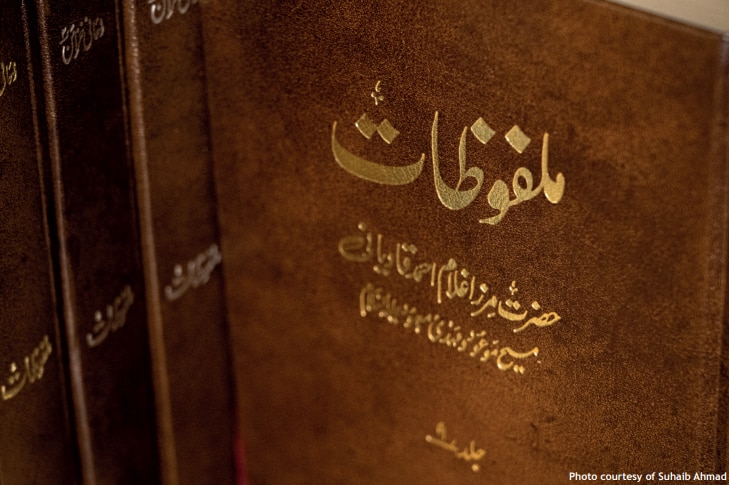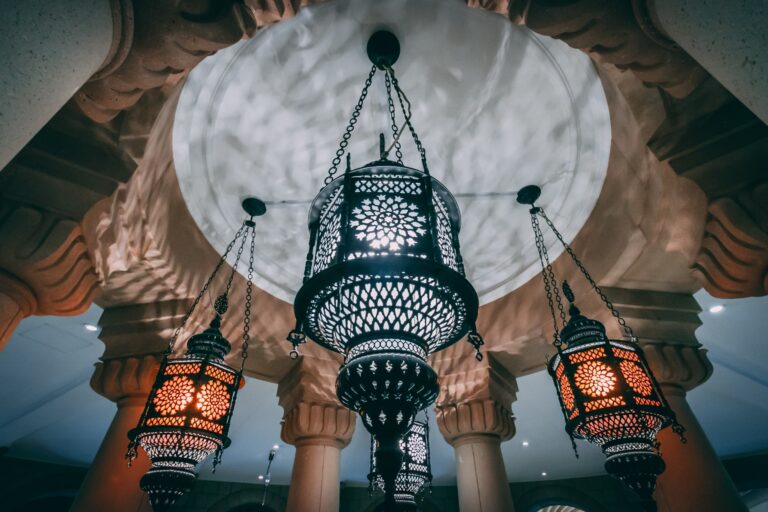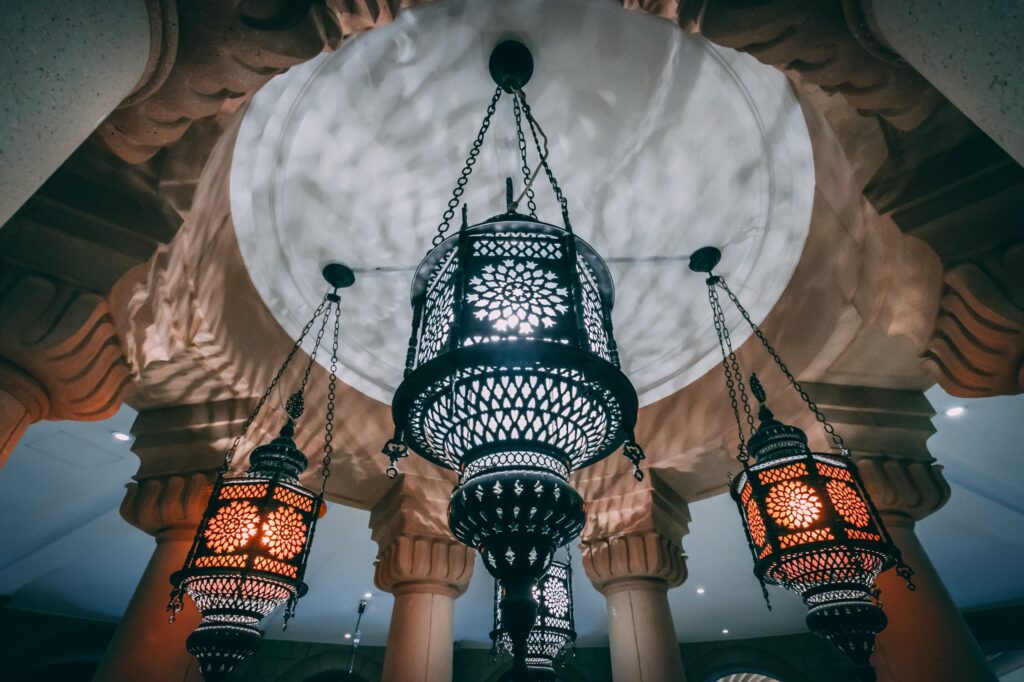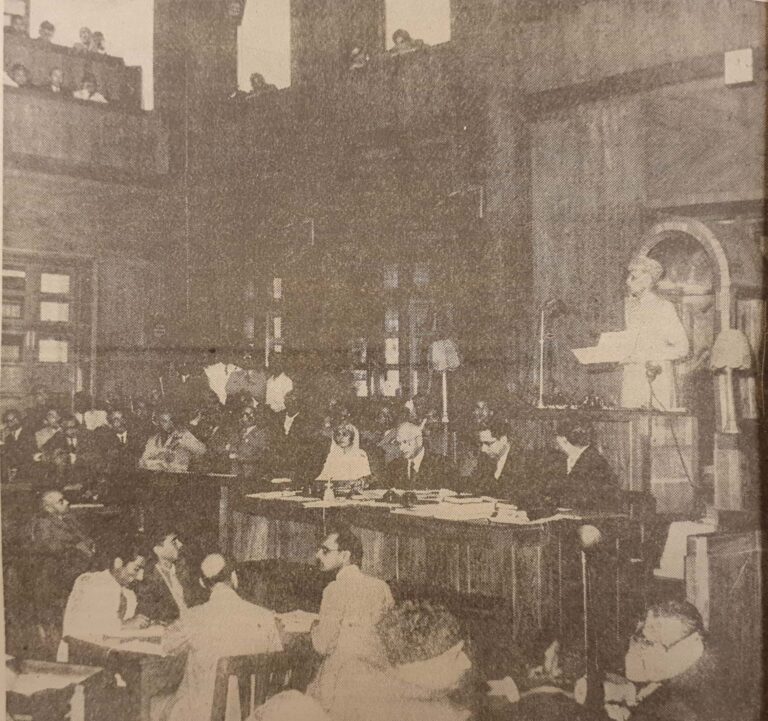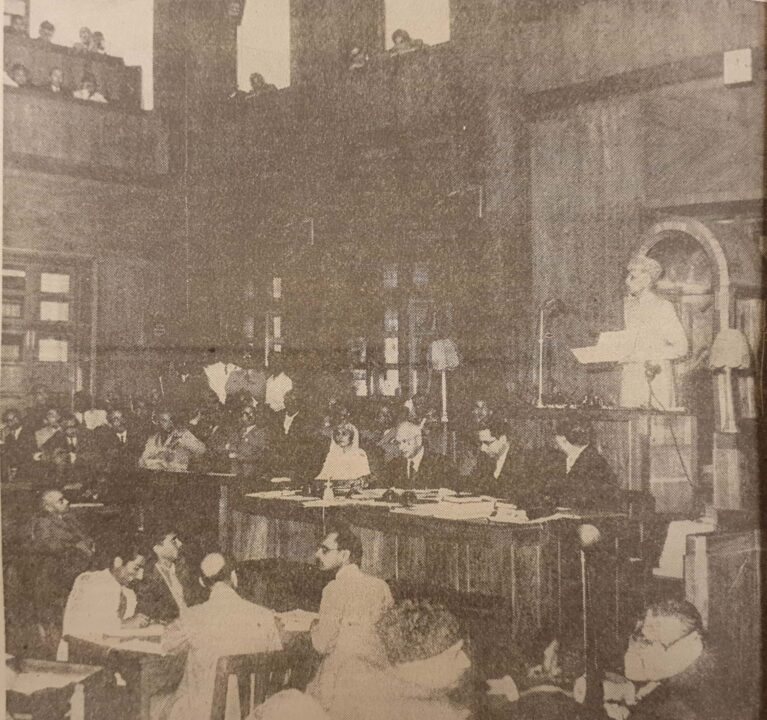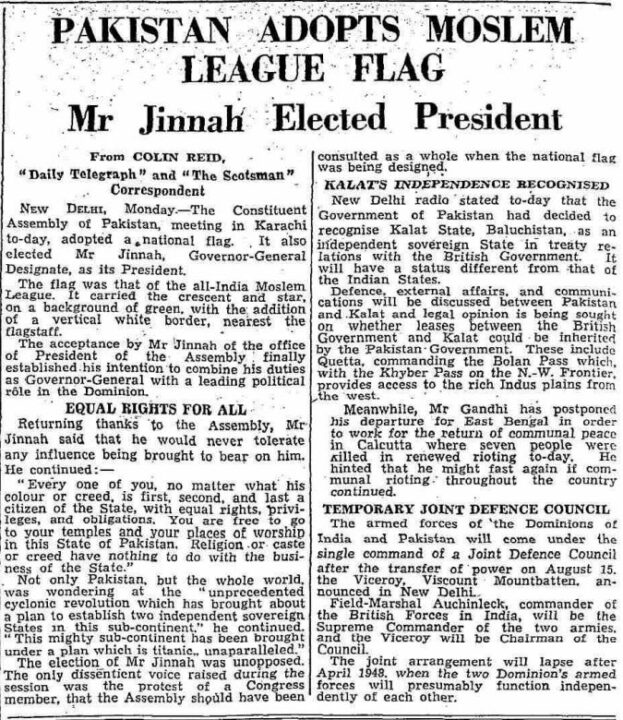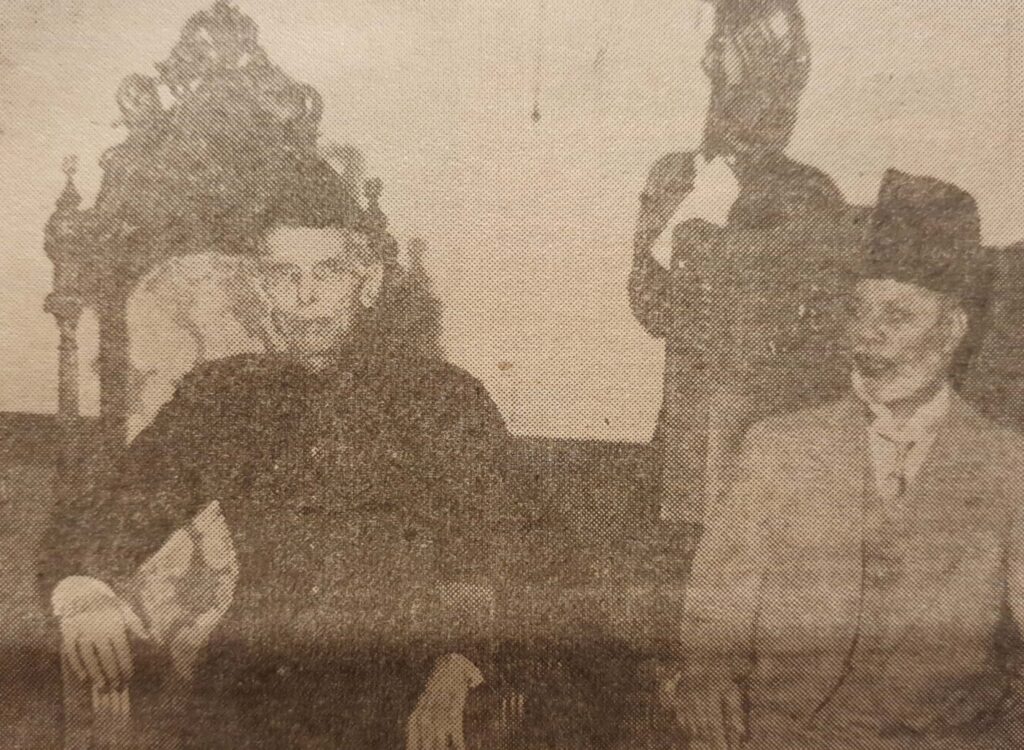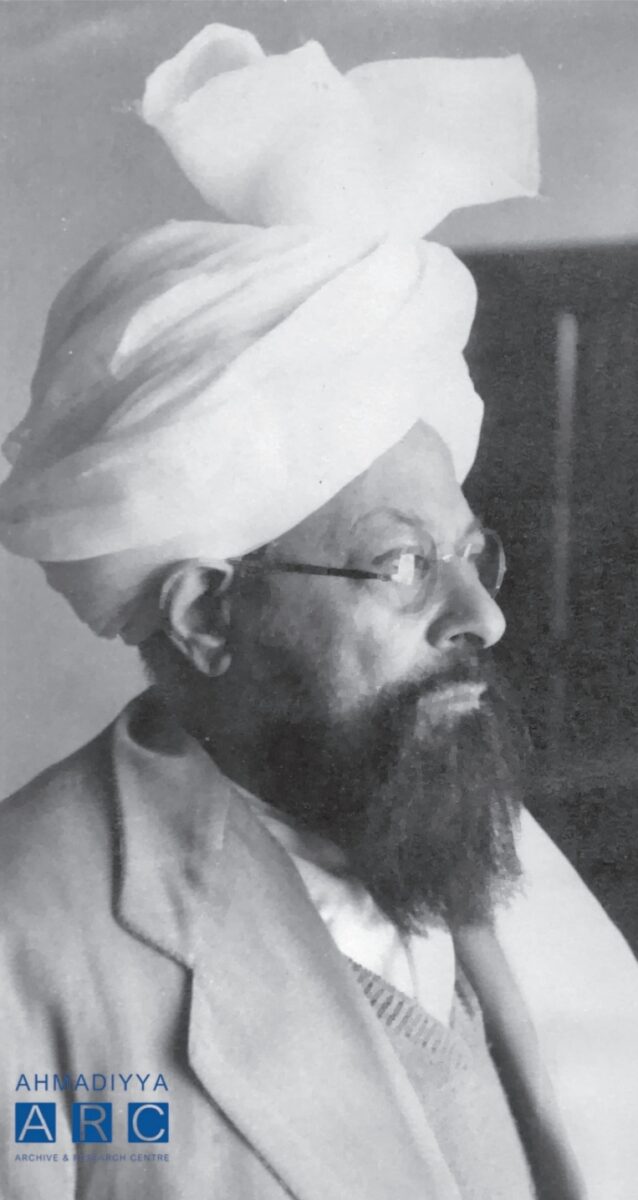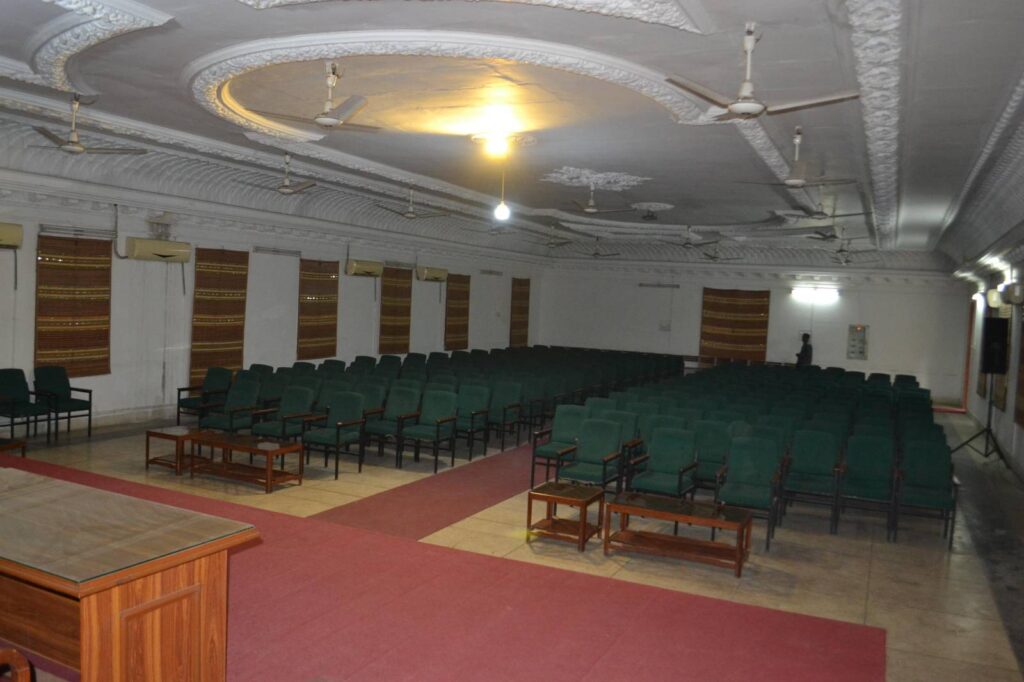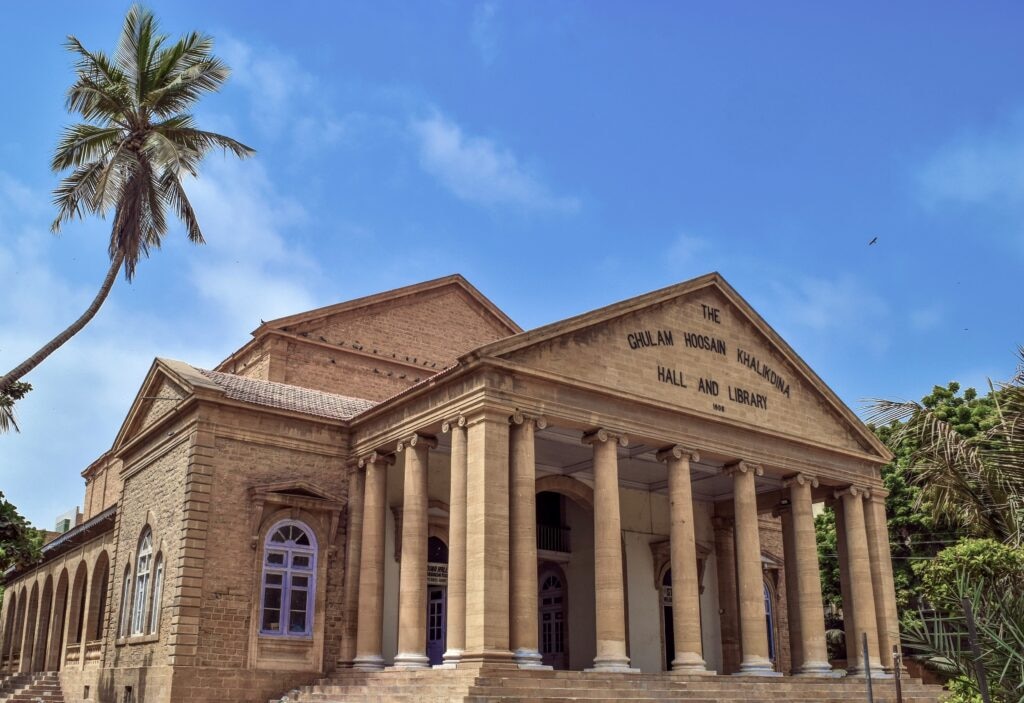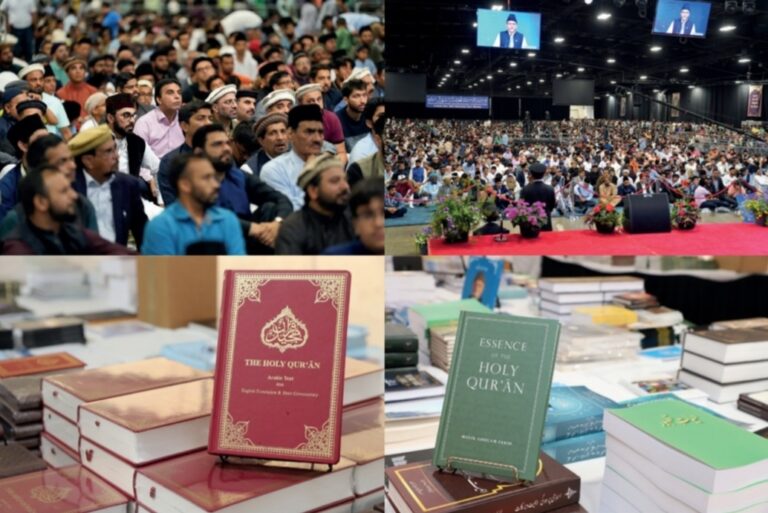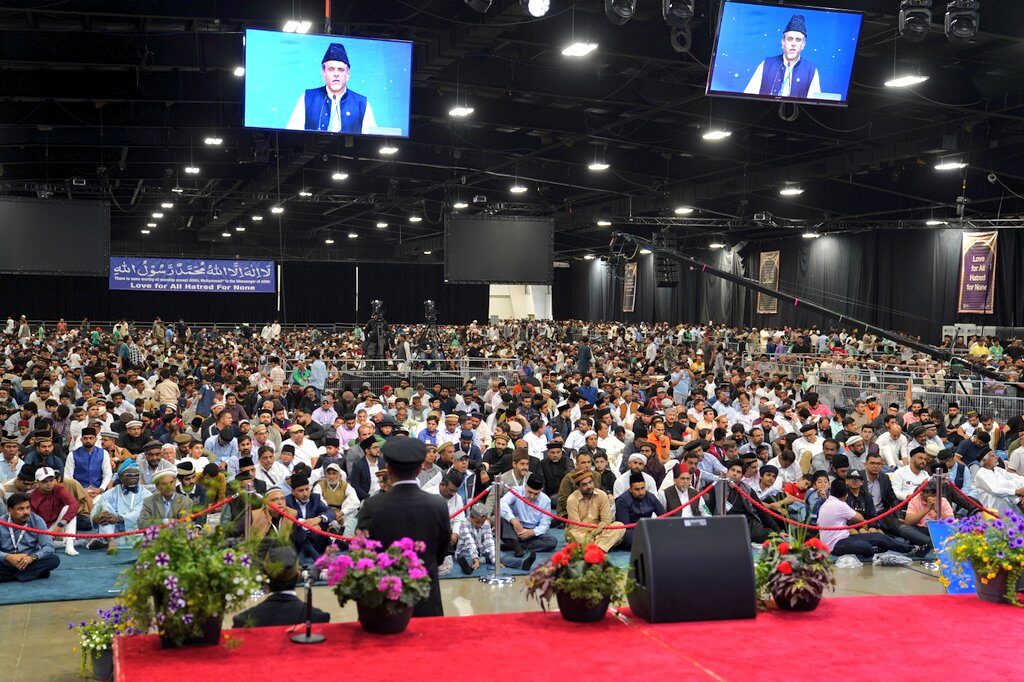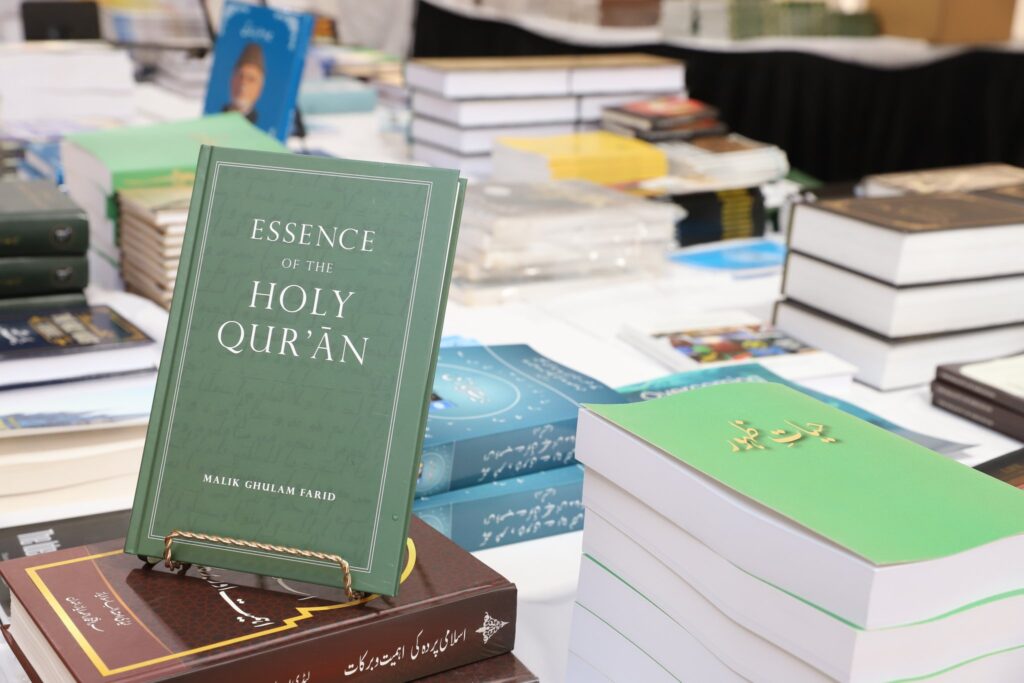Friday Sermon
21 July 2023
Muhammadsa: The great exemplar
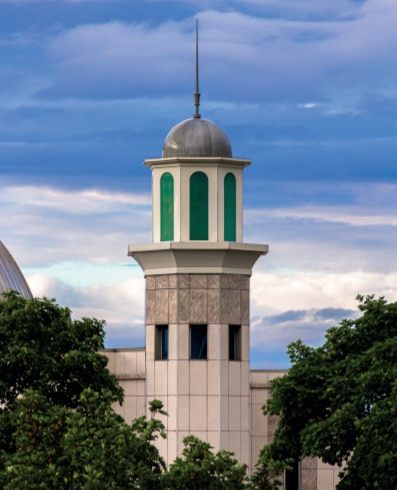
After reciting the tashahud, ta‘awuz and Surah al-Fatihah, Hazrat Khalifatul Masih Vaa stated:
The accounts from the life of the Holy Prophetsa are being mentioned with reference to the Battle of Badr. I will present some more details in relation to this. With regards to the Holy Prophet’ssa kind treatment of the prisoners, once the Battle of Badr had concluded, it is written in Tabaqat Ibn Sa’d that when the prisoners of Badr arrived, the paternal uncle of the Holy Prophetsa, Hazrat Abbasra, was also among them. As such, the Holy Prophetsa did not sleep the entire night. One of his companions asked the Holy Prophetsa: “O Messengersa of Allah! What has kept you awake?” Upon this, the Holy Prophetsa replied: “The sound of agony from Abbas.” Subsequently, someone went and loosened the shackles of Hazrat Abbasra. He was tied up and he slightly loosened the chains. Upon this, the Holy Prophetsa said: “What has happened? I can no longer hear the sound of Abbas in agony.” Upon this, the individual replied: “I slightly loosened his shackles.” Upon this, the Holy Prophetsa said: “Then you should do the same for all prisoners.” (Ibn Sa’d, Tabaqat al-Kubra, Vol. 4, p. 9, Dar al-Kutub al-Ilmiyyah, Beirut, Lebanon 2012)
The shackles of only one person should not be loosened on account of his relationship to the Holy Prophetsa.
In relation to the prisoners of the Battle of Badr, Hazrat Mirza Bashir Ahmadra has presented the details in The Life and Character of the Seal of Prophetssa:
“The Holy Prophetsa remained in the valley of Badr for three days. This time was spent shrouding and burying the martyrs and nursing the wounded. Similarly, it was during these days that the spoils were collected and sorted. The prisoners of the disbelievers, which equated to seventy, were secured and given into the custody of various Muslims. The Holy Prophetsa strictly directed the Muslims to treat the prisoners gently and kindly; and to ensure that their comforts were looked after. The Companions, who possessed a passionate love of fulfilling their Master’s every desire, acted upon this admonition so wonderfully that the like of it cannot be found in the history of the world. Hence, from among these prisoners, one prisoner named Abu ‘Aziz bin ‘Umair relates that:
“‘Due to the exhortation of the Holy Prophetsa, the Ansar would give me baked bread, but they themselves, would subsist on dates, etc. Many a time, it would so happen that even if they managed to procure a small piece of bread, they would give it to me, and would not eat it themselves. If I would ever return it to them in embarrassment, they would insist that I have it.’
“Those prisoners who did not have sufficient clothing were given clothing. As such, ‘Abdullah bin Ubayy gave Abbas his shirt.
“Sir William Muir admits to the kind treatment of these prisoners in the following words:
“‘In pursuance of Mahomet’s[sa] commands, the citizens of Medina, and such of the Refugees as already had houses of their own, received the prisoners, and treat them with much consideration. “Blessings be on the men of Medina!” said one of these prisoners in later days: “they made us ride, while they themselves walked: they gave us wheaten bread to eat when there was little of it, contenting themselves with dates.”’”
“Sir William Muir adds:
“‘It is not surprising that when, some time afterwards, their friends came to ransom them, several of the prisoners who had been thus received, declared themselves adherents of Islam (the result of the prisoners being treated in this manner was that some of them became Muslim) […] Their kindly treatment was thus prolonged, and left a favourable impression on the minds even of those who did not at once go over to Islam.’” (The Life & Character of the Seal of Prophetssa, Vol. 2 pp. 157-158)
In relation to the significance and the impact of the Battle of Badr, it is mentioned that ‘Abdullah bin Rawahara and Zaid bin Harithahra brought the glad tidings of victory in the Battle of Badr to Medina. Upon hearing this announcement, the enemy of Allah, Ka’b bin Ashraf, started accusing them of lies. He said: “If Muhammad[sa] has killed these prominent leaders then it would be better to live inside the earth, rather than on it.” That is to say, it would be better to die than to remain alive. (Al-Sirah al-Halabiyyah, Vol. 2, p. 250, Dar al-Kutub al-Ilmiyyah, Beirut, 2002)
Stating the outcome of the Battle of Badr, ‘Allama Shibli Nomani writes in his book, “The Battle of Badr had a diverse impact on the religious and social circumstances [of the land]. This was, in fact, the first step in the advancement of Islam. All prominent leaders of the Quraish, who were like iron walls in the way of Islam, perished. Following the death of ‘Utbah and Abu Jahl, Abu Sufyan was handed the leadership of the Quraish and this commenced the Umayyad dynasty. However, the real strength and might of the Quraish had already diminished. In Medina, ‘Abdullah bin Ubayy bin Sulool was still openly declaring himself to be a disbeliever, but now seemed to have come towards the fold of Islam (following the victory of Badr, he accepted Islam superficially), although he remained a hypocrite for his entire life and died in this very state. The rest of the Arab tribes, who were witnessing these events, although were not won over, but nonetheless receded (many tribes, although they did not convert to Islam, certainly backed down after witnessing the victory [of Badr]. They stopped scheming against the Muslims, or became afraid). In addition to this change in situation, new developments emerged amongst the opposition. A pact had already been made with the Jews that they would stand with them [the Muslims] in all circumstances. However, this victory kindled a fire of jealousy within them and they were unable to suppress it […] Previously, the Quraish only lamented over Hazrami, but following the Battle of Badr, every household was a mourning place and every child in Mecca was desperate to avenge the death of those who were killed in the Battle of Badr. Hence, the incident of Suwaiq and the Battle of Uhud were a result of this zeal of theirs.” (Shibli Nomani, Sirat al-Nabiyy, Vol. 1, pp. 210-211, RZ Packages, Lahore 1408 AH)
Mentioning the outcome of the Battle of Badr, Hazrat Mirza Bashir Ahmadra has written the following:
“Until now, many people from the tribes of Aus and Khazraj still stood firm upon polytheism. The victory of Badr resulted in a movement among these people and upon witnessing this magnificent and extraordinary victory, many people from among them became convinced of the truth of Islam. Thereafter, the element of idol worship began to diminish very rapidly in Medina. However, there were also some in whose hearts this victory of Islam had sparked a fire of rancour and jealousy. Finding it unwise to oppose openly, outwardly they accepted Islam, but from the inside, they sought to uproot it and joined the party of the hypocrites. The most prominent among the latter class of people was ‘Abdullah bin Ubayy bin Sulul, who was a very renowned chieftain of the Khazraj tribe. Due to the arrival of the Holy Prophetsa to Medina, he had already suffered the shock of having his leadership taken from him. After Badr, this individual became a Muslim at the outset, but his heart was satiated with malice and enmity towards Islam. He became the leader of hypocrisy and secretly began to hatch a series of conspiracies against Islam and the Holy Prophetsa.” (The Life & Character of the Seal of Prophetssa, Vol. 2, pp. 172-173)
Hazrat Mirza Bashir Ahmadra further states:
“The battle of Badr had a deep and lasting effect on both the disbelievers and the Muslims. It is for this reason that this battle possesses a distinct significance in the history of Islam; to such an extent, that the Holy Quran has named this battle ‘Yaum al-Furqan,’ i.e., the day upon which a manifest distinction was made between Islam and disbelief. There is no doubt that other wars also took place between the Quraish and the Muslims afterwards, and some of them were immensely fierce. At times, the Muslims were confronted with delicate situations, but in the battle of Badr, the spine of the Quraish had been broken, which no surgical operation could permanently repair thereafter. As far as the number of casualties was concerned, this was no great defeat. The death of seventy or seventy-two warriors for a people like the Quraish, can in no way be deemed a national devastation. In the battle of Uhud, this was the number of Muslim casualties. However, this loss did not even prove to be a temporary hindrance in the victorious pathway of the Muslims (even though the Muslims were very weak at the time). Why then was the Battle of Badr dubbed Yaum al-Furqan? In response to this question, the best answer is in the following words of the Holy Quran:
يَقۡطَعَ دَابِرَ الۡکٰفِرِيۡنَ
“‘Verily, on that day, the root of the disbelievers was cut off.’
In other words, the blow of the Battle of Badr hit the root of the disbelievers, and it was shattered to pieces. If this very blow had struck the branches instead of the root, irrespective of how great a loss it would have inflicted, this loss would have been nothing compared to the one actually incurred. However, this blow to the root turned this lush green tree to a pile of coal, in a matter of moments. Only those branches survived which attached themselves to the other tree, before drying away. Therefore, in the field of Badr, the loss of the Quraish was not measured by the number of men who died, but rather, by the people who died. When we cast a glance upon the casualties of the Quraish from this perspective, there remains no room for even the slightest doubt or uncertainty, that in Badr, the root of the Quraish was truly cut off. ‘Utbah, Shaibah, Umayyah bin Khalf, Abu Jahl, ‘Uqbah bin Abi Mu‘it and Nadr bin Harith, etc., were the moving spirit of the Quraish. This spirit flew off from the Quraish in the valley of Badr forever, and they were left like lifeless bodies. It is for this reason that the Battle of Badr has been given the name of Yaum al-Furqan.” (The Life & Character of the Seal of Prophetssa, Vol. 2, pp. 165-166)
In reference to this, Hazrat Musleh-e-Maudra states:
“This is the very battle that Allah the Almighty has named ‘Furqan’ in the Holy Quran, and it was during this battle that such Arab chieftains were eliminated who left their homes claiming that they would destroy Islam once and for all. They were eliminated in a manner that today, their names have been forgotten. If their names are recalled at all, affiliation to them is not a means of pride but a means of disgrace. Ultimately, Allah the Almighty granted the Muslims a grand victory through this battle.” (Sirat-un-Nabisa, Anwar-ul-Ulum, Vol. 1, p. 610)
Hazrat Musleh-e-Maudra also states:
“There is no doubt that even after this [battle], the Muslims were subject to cruelty and forced to fight against the disbelievers on various occasions. However, the Battle of Badr unquestionably utterly crushed the strength of the disbelievers and demonstrated before them the might of the Muslims. The Battle of Badr referred to as ‘Furqan’ in the Holy Quran, has also been prophesied in the Bible. In the book of Isaiah, chapter 21 verses 13 to 17, it is recorded: ‘ A prophecy against Arabia: You caravans of Dedanites, who camp in the thickets of Arabia, bring water for the thirsty; you who live in Tema, bring food for the fugitives. They flee from the sword, from the drawn sword, from the bent bow and from the heat of battle. This is what the Lord says to me: “Within one year, as a servant bound by contract would count it, all the splendour of Kedar will come to an end. The survivors of the archers, the warriors of Kedar, will be few.” The Lord, the God of Israel, has spoken.’”
Hazrat Musleh-e-Maudra further states:
“In these words of Prophet Isaiah, it was prophesied that exactly one year after the period of migration, a war would take place in Arabia that would reduce the splendour of Kedar to dust. Those who accuse the Holy Prophet Muhammadsa of fleeing will flee themselves in the presence of their own armies. Their state will be that the corpses of their commanders and generals will be left on the battlefield, and ultimately, the Valley of Mecca will lose its generals, thereby forfeiting the strength it once had. Similarly, the Holy Quran foretold of an eleventh night and prophesied that precisely one year following the migration, the disbeliever’s strength would be broken whilst victory and triumph would dawn upon the Muslims. Thus, after exactly one year, the Battle of Badr took place during which many ranking leaders were killed, and the Muslims attained a resounding victory over them.”
Hazrat Musleh-e-Maudra continues:
“Ponder! Until the first Ramadan after coming to Medina, it had been 10 years since this prophecy was made. The month of Ramadan would begin the eleventh year. After this year elapsed, at the beginning of the eleventh year, on 17 Ramadan, the Battle of Badr took place during which prominent disbelievers were killed, bringing an end to their vicious attacks. The eleventh night that had overcome the Muslims had now passed. Through the favour and help of Allah the Almighty, the Muslims witnessed the dawn of victory and triumph.” (Tafsir-e-Kabir, Vol. 8, p. 515)
Regarding the excellence of the Companions who took part in the Battle of Badr, it is recorded that Hazrat Gabriel came to the Holy Prophetsa and said, “Amongst the Muslims, what rank do you give those who partook in the Battle of Badr?” The Holy Prophetsa replied, “They are the best of Muslims,” or a similar statement. Angel Gabriel said, “Similarly, those angels who partook in the Battle of Badr also hold a high rank.” (Sahih al-Bukhari, Kitab al-Maghazi, Bab Shuhud al-Mala’ikah Badran, Hadith 3992)
The incident I am about to narrate has already been mentioned in reference to Hazrat Alira, however, I will mention it again due to its significance in this context.
Ubaidullah bin Abi Rafira narrates that he heard Hazrat Alira say:
“The Holy Prophetsa sent Zubairra, Miqdad bin Aswadra and I, and instructed us to go to Roza Khakh. There, we would find a woman riding a camel with a letter that we should confiscate. We departed as our horses galloped swiftly. When we reached Roza Khakh, we found a woman riding a camel there. We asked her to surrender the letter. She said, ‘I do not have any letter.’ We replied, ‘You must surrender the letter to us, otherwise we will remove your clothes and search you.’ Upon this, she took the letter out of her hair and gave it to us. We brought the letter back to the Holy Prophetsa. When the letter was opened, it read, ‘From Hatib bin Abi Balta’ah to the people of Mecca.’ He was informing them about a plan of the Holy Prophetsa. The Holy Prophetsa summoned Hatib and asked, ‘O Hatib, what is this?’ He replied, ‘O Messengersa of Allah, please do not be quick to pass judgment on me. I am a man who settled among the Quraish. I am not native to them. Your other migrant Companions have relatives in Mecca through whom they have secured their homes and wealth. Because I do not have relatives among them, by doing this I wished to win their favour so they would be considerate towards me. I have not committed this act out of disbelief or apostasy, for I could never prefer disbelief after having accepted Islam.’ (He said that he could never be drawn to disbelief after accepting Islam with a true heart). Upon hearing this, the Holy Prophetsa said, ‘He has said the truth to you.’ Hazrat Umarra remarked, ‘O Messengersa of Allah, permit me to smite this hypocrite’s neck.’ The Holy Prophetsa replied, ‘He participated in the Battle of Badr. You do not know, but Allah has witnessed the Companions of Badr and has said, “Do as you please, for I have covered your sins.”’” (Sahih al-Bukhari, Kitabl al-Jihad wa al-Siyar, Bab al-Jasus, Hadith 3007)
In other words, they would no longer commit major sins, and they would meet a good end. This meant that these people would not die in a state of disbelief. Thus, it is evident from the words of Hazrat Hatibra – as I have already stated – that disbelief can never be preferred after accepting Islam.
Hazrat Abu Hurairahra relates that the Holy Prophetsa said, “Perhaps Allah the Almighty has looked upon the Companions of Badr and said, ‘Do as you please, for I have forgiven you.’” (Sunan abi Da’ud, Kitab al-Sunnah, Bab fi al-Khulafa, Hadith 4654)
In other words, apart from disbelief, Allah the Almighty will forgive their common and minor mistakes. Through these words, Allah the Almighty also assured them that they would never devolve into disbelief and that their fate would be auspicious. This is also what is meant by these words. Even if some mistakes or sins are committed, they would be as a result of human weakness, which would be forgiven by Allah the Almighty.
Umm-ul-Momineen, Hazrat Hafsahra relates, “The Holy Prophetsa said, ‘I am hopeful that those who participated in Badr and Hudaibiyah will never, God willing, enter the hellfire.’ I submitted, ‘O Messengersa of Allah, has Allah not stated:
وَاِنۡ مِّنۡکُمۡ اِلَّا وَارِدُہَا کَانَ عَلٰي رَبِّکَ حَتۡمًا مَّقۡضِيًّا
“And there is not one of you but will come to it.”’ Upon this, the Holy Prophetsa said, ‘Have you not heard the following words of Allah the Almighty:
ثُمَّ نُنَجِّي الَّذِيۡنَ اتَّقَوۡا وَّنَذَرُ الظّٰلِمِيۡنَ فِيۡہَا جِثِيًّا
“Then We shall save the righteous and We shall leave the wrongdoers therein, on their knees.”’” (Sunan Ibn Majah, Kitab al-Zuhd, Bad Zikr al-Ba’th, Hadith 4281)
Even during the Caliphate of Hazrat Umarra, when monetary allowances for the Companions were being instated, the allowances for the Companions of Badr were especially distinguished. The Companions of Badr themselves would take pride in their participation in the battle. [Sir William] Muir writes:
“These were the peerage of Islam. ‘Bring me here the garment in which I went forth to Bedr; for this end have I kept it laid up unto this day.’ So spake Sa‘d, the youthful convert of Mecca, now about to die at fourscore years of age. Crowned with renown as the conqueror of Persia, the founder of Cufa, and the Viceroy of Irac, his honours were all cast into the shade by the glory of having shared in the battle of Bedr. In his eyes the ‘garment of Bedr’ was the highest badge of nobility, and in it would he be carried to his grave. ” (The Life & Character of the Seal of Prophetssa, Vol. 2, pp. 168-169)
One can gauge the significance and excellence of the Companions of Badr from the fact that one of the signs of the advent of the Mahdi in this Ummah set out by the Holy Prophetsa was that he would also have a book in which he has names of 313 companions – in accordance with the number of Companions of Badr. Thus, the Promised Messiahas states:
“It has been mentioned in an authentic Hadith that the Promised Mahdi would have a published book in which the names 313 of his companions would be written. As such, it is necessary to mention that this prophecy has been fulfilled today. It is apparent that before now, there was not a single person in this Ummah who claimed to be the Mahdi at whose time there were printing presses or who had a single book in which he could have written the names of 313 people. Of course, if this work was within the scope of human effort, then there could have been many people before this who could have falsely made claims about themselves. However, the reality is that the prophecies of God contain such extraordinary requirements that a liar cannot take advantage of them, and they are not afforded the means which are granted to the truthful.”
The Promised Messiahas further states:
“In his book Jawahir al-Asrar which was published in 840 AH, Sheikh Ali Hamza bin Ali Malik Al-Tusi writes the following about the Promised Mahdi, (the translation of which is) that the Mahdi will hail from a village called Kad’ah.’ (This in fact is the Arabic version of Qadian. He then says,) ‘God will prove the truthfulness of that Mahdi and will gather his friends from far and wide, who will be equal in number to the people of Badr, in other words, they will number 313, and their names, character and qualities will be written in a published book. It is clear that before now no one has claimed to be the Promised Mahdi and also had a published book which would contain the names of his friends. However, I have previously written 313 names in A’ina-e-Kamalat-e-Islam and to further confirm this I shall write those 313 names here once again. (The Promised Messiahas wrote this in the appendix of the book, Anjam-e-Atham). Every fair-minded individual should know that this is yet another prophecy that was fulfilled in my favour. In accordance with what has been stated in the narration, it is necessary to state from the outset that all of these companions possess qualities of truthfulness and piety and as far as their ranks, which Allah the Almighty knows best, some excelled others in love and devotion to Allah and being occupied in service to the faith. Observe, these 313 sincere people who are mentioned in this book are a fulfilment of this very prophecy which is found in the traditions of the Holy Prophetsa. The prophecy also contains the words ‘Kad’ah’ which is clearly pointing towards Qadian. The entire purport of this Hadith is that the Promised Mahdi will be born in Qadian, and will have a published book in which the names of 313 of his friends will be written. Everyone knows that it was not possible for me to write the name of my town Qadian in books that were written a thousand years ago. Nor did I create a printing machine on account of which it could be said that I invented the printing press in this era for this very purpose (he did not invent the printing press). It was also beyond my scope to bring about 313 companions. In fact, it was God Almighty who procured these means in order to fulfil the prophecy made by His Messengersa.” (Zamimah Anjam-e-Atham, Ruhani Khazain, Vol. 11, pp. 324-325, 329)
Whilst stating the similarities between the Holy Prophetsa and Prophet Mosesas in relation to the Battle of Badr, the Promised Messiahas states:
“Just like the Israelites, God’s rightly guided people suffered great difficulties for 13 years in Mecca at the hands of the disbelievers. These difficulties were far greater than those inflicted by the Pharaoh upon the Israelites. Eventually, these rightly guided people fled Mecca along with he who was most righteous among them and in his leadership, just like the Israelites did. Then, the people of Mecca chased after them in order to kill them, just like Pharaoh who chased after the Israelites in order to kill them. Ultimately, it was as a result of this pursuit that they met their ruin at Badr, just as Pharaoh and his army met their ruin in the Nile River. It was to uncover this connection that upon seeing the body of Abu Jahl among those who were killed at Badr, the Holy Prophetsa said that this person is the Pharaoh of this nation. Just as Pharaoh and his army perishing in the Nile River was a matter which was witnessed and experienced and was thus something which no one could object to, so too was the pursuit made by Abu Jahl and his army resulting in defeat at the Battle of Badr a matter which was witnessed and experienced, the denial of which would be foolish and lunacy […] The people bearing resemblance to the Israelites, in other words, those people of God who were freed by our Leader and Master from the cruelties of the Meccans sang hymns after the Battle of Badr just as the Israelites did on the shores of the Nile River. Those Arabic hymns that were sung in the plains of Badr are still preserved in books to this day.” (Ayyam-us-Sulh, Ruhani Khazain, Vol. 14, pp. 290-291)
Then, at another instance, the Promised Messiahas states:
“The example given in the Torah in Deuteronomy is of that very prophet who was accompanied with divine help and along with his community bore hardships and every type of difficulty for 13 years and then eventually fled along with his community, but they were followed. Ultimately, within a few hours in the battle at Badr, Abu Jahl and his people were smitten by swift swords just as Pharaoh and his army perished by the swiftness of the Nile River. Observe the clarity and how from the standpoint of witness and experience both the incidents of Egypt and Mecca bear such stark resemblance.” (Ayyam-us-Sulh, Ruhani Khazain, Vol. 14, pp. 292)
It is stated in the Holy Quran:
وَلَقَدۡ نَصَرَکُمُ اللّٰہُ بِبَدۡرٍ وَّاَنۡتُمۡ اَذِلَّةٌ
“And Allah already helped you at Badr when you were weak.” (3:124)
In his book Khutbah Ilhamiyyah, whilst mentioning a subtle resemblance between Badr [full moon] and the fourteenth century, the Promised Messiahas states, the Urdu translation is as follows:
“The number 400 is after the migration of the Holy Prophetsa, who was the Seal of Prophets so that the victory of Islam which had already been promised in the Holy Quran would come to fruition. In other words, the statement of God:
وَلَقَدۡ نَصَرَکُمُ اللّٰہُ بِبَدۡرٍ وَّاَنۡتُمۡ اَذِلَّةٌ
“Ponder over this verse like those who possess sight, because certainly, this verse points towards two Badrs. First was the Badr which came for the help of the first ones, and the second Badr which was a sign for those to come after. There is no doubt that this verse contains a subtle indication towards that time in the future which was to be like the night of Badr and would manifest 400 years after a period of 1,000 years. This is the metaphor used by God Almighty when He mentions the night of Badr. Further to this, we also accept that this verse has other meanings as well which pertain to previous times, as scholars will be well aware, because this verse has two perspectives; there are two [times of] help and two Badrs. One Badr pertains to previous times, whereas the other Badr pertains to the times yet to come, when the Muslims would be in an extremely lowly state, as you can witness in today’s current times. Islam started like the crescent moon, and it was decreed that ultimately, in the latter days, it would turn into a full moon [Badr] by the command of Allah. Hence, the wisdom of God Almighty dictated that in this century, Islam should become like the Badr [full moon], which would also be similar to Badr in terms of its numbers. It is these very meanings that God Almighty indicates in the words,
وَلَقَدۡ نَصَرَکُمُ اللّٰہُ بِبَدۡرٍ
“[And Allah already helped you at Badr]
“Hence, ponder over this matter with careful consideration and do not be like the ignorant. Indeed, the words لَقَدۡ نَصَرَکُمُ have been used as يَنْصُرُکُم in light of its other aspects, just as it is apparent to those who possess understanding. Therefore, for the sake of Islam, God Almighty decreed that after having to face a state of weakness twice, Islam should also be honoured twice, in contrast to the Jewish people for whom it was decreed as punishment that after two honours they would face two humiliations, just as you read in the accounts of those transgressors and tyrants in the Chapter Bani Isra’il. At the time when the Muslims had to endure humiliation in Mecca, God made a promise to them in the following words,
اُذِنَ لِلَّذِيۡنَ يُقٰتَلُوۡنَ بِاَنَّہُمۡ ظُلِمُوۡا ؕ وَاِنَّ اللّٰہَ عَلٰي نَصۡرِہِمۡ لَقَدِيۡرُ
““[Permission to fight is given to those against whom war is made, because they have been wronged — and Allah indeed has power to help them. (22:40)]“By saying ‘to help them’, God indicated that the disbelievers would suffer punishment at the hands of the believers. And so, this promise of God was fulfilled on the day of Badr when the disbelievers were killed by the swords of Muslims raining down on them.” (Khutbah Ilhamiyyah, Ruhani Khazain, Vol. 16, pp. 273-277)
Then, the Promised Messiahas states:
“The situation in the fourteenth century is similar to the one that obtained on the occasion of Badr, and about which Allah says:
وَلَقَدۡ نَصَرَکُمُ اللّٰہُ بِبَدۡرٍ وَّاَنۡتُمۡ اَذِلَّةٌ
“[And Allah already helped you at Badr when you were weak]
“This verse actually implied a prophecy: When in the fourteenth century Islam becomes frail and weak, God, according to His promise, shall come to its help.” (Lecture Ludhiana, pp. 44-45)
The Promised Messiahas further states:
“Observe how the companions were divinely supported at Badr; and Allah the Exalted states that this support was at a time when the Muslims were few. On the occasion of Badr, the back of the disbelievers was broken.
“There was a prophecy for the future in the magnificent sign that was manifested at Badr. The full moon is also called badr and so, this is an allusion to the succour of Allah Almighty, which was to be manifested in the fourteenth century. Even illiterate women would say that the fourteenth century is one that would bring good fortune and blessing. The words of God Almighty were fulfilled and in the fourteenth century, as per divine will, the spiritual reflection of the name Ahmad was manifested. I am the one about whom a prophecy was made (the Promised Messiahas says this regarding himself) in the incident of Badr, to whom the Messenger of Allah, peace and blessings of Allah be upon him, conveyed his greetings of peace. But alas! When that day arrived and the full moon emerged, I was called a deceiver, I was accused of being selfish. Pity on those who have seen the truth but yet do not see; those who saw the awaited era but failed to recognise it. Those who stood on pulpits and tearfully proclaimed that this prophecy would be fulfilled in the fourteenth century have died, and now those remain who stand on pulpits and announce that the one who has appeared is a liar! What has happened to these people? Why do they not see and why do they not reflect? Even in the previous era, it was at Badr that Allah the Exalted bestowed His support, and that divine support was for a people who were referred to as adhillah (weak). It was at a time when only 313 people entered the field of battle with a few wooden swords. Most of those 313 were small children. What could be a greater state of weakness? On the opposing end was a large and elite force of experienced and powerful warriors. In terms of materialistic equipment, the Holy Prophetsa had nothing. In the face of these circumstances, the Messenger of Allah, peace and blessings of Allah be upon him, prayed:
اللّٰھُمَّ اِنْ اَھْلَکْتَ ھٰذِہِ الْعِصَابَةَ لَنْ تُعْبَدَ فِي الْاَرْضِ اَبَدًا
“Meaning, O Allah! If, today, you allow this community to perish, there will remain no one to worship You.
“Hearken! I proclaim with certainty that even in this age we are faced with a state of affairs that are akin to the time of Badr. In the same way, Allah the Exalted is preparing a community, and the very same words, badr and adhillah (the weak), have been used in connection with them.” (Malfuzat, Vol. 2, pp. 83-84)
The Promised Messiahas states:
“The number fourteen has a very deep connection in this respect. The moon of the fourteenth century is complete. It is to this very point that Allah the Exalted alludes in the following:
وَلَقَدۡ نَصَرَکُمُ اللّٰہُ بِبَدۡرٍ وَّاَنۡتُمۡ اَذِلَّةٌ
“[And Allah already helped you at Badr when you were weak. (3:124)]
“At that time also, the community of the Holy Prophetsa was small and yet they overcome the enemy. And now, there is the Badr of our present age (of the Promised Messiahas) as well.” (Malfuzat [1984], Vol. 4, p. 12)
With regards to the revelation: “Do not forget the event of the Battle of Badr”, Hazrat Qadi Abdur Rahimra has written in his diary of 17 February 1904: “Last night, the Promised Messiahas related a dream, in which he heard someone say: ‘Do not forget the event of the Battle of Badr’”. (Tadhkirah [2004], p. 668)
May Allah the Almighty instil within us an understanding of the significance of the Battle of Badr and may we understand the reason for the advent of the true servant of the Holy Prophetsa. May Allah the Almighty enable the Muslim Ummah to understand the significance of the event of Badr and enable them to recognise the Promised Messiahas, who has appeared in subservience to the Holy Prophetsa and through this they will become worthy of regaining their lost grandeur and glory.
I now wish to speak in relation to Jalsa Salana. Insha-Allah, the Jalsa Salana UK shall commence next Friday. This year, a large number of guests will be coming to attend after a gap of approximately 3-4 years. In fact, the guests have already started to arrive. May Allah the Almighty grant ease and comfort for all those who are travelling, and may they arrive here safely. May they derive true blessings from the purpose of the Jalsa. Likewise, may all the Ahmadis who reside in the UK participate in the Jalsa with the true fervour and spirit, with the sole objective in mind that they shall strive to attain the spiritual rewards during the days of Jalsa. Similarly, all the workers who have been appointed to various duties during the Jalsa should strive to serve all the participants of the Jalsa as they are the guests of the Promised Messiahas.
This time, it is estimated that there will be an increase in the number of participants, and due to this, it is possible that there remain some organisational shortcomings. Masha-Allah, I am hopeful that the UK Jamaat has become so experienced in its organisation, that it will have already resolved the majority of the issues, and there will only remain minor shortcomings, if at all. Furthermore, if any problems do arise, they shall be able to resolve them in the best way possible. May Allah make it so that no such issues arise which cause any inconvenience to the guests.
Islam places great emphasis on honouring and respecting guests. Hence, those guests who are coming upon the call of the Promised Messiahas, purely for religious purposes, every single one of those on duty and the hosts should especially serve and honour them. This service of theirs should be carried out purely out of the sentiments of sacrifice, and whilst seeking the pleasure of Allah the Almighty.
What are the teachings of Islam with regards to the hospitality of guests, and what did the Holy Prophetsa expect in terms of hospitality of guests? On one occasion, the Holy Prophetsa said: “Whosoever believes in Allah and the Last Day, should honour their guests.” (Sahih al-Bukhari, Kitab al-Adab, Bab Ikram al-Zaif, Hadith 6135).
During the days of Jalsa, people from all different nations come and have varying temperaments. Sometimes difficulties arise in managing people of different temperaments. Owing to their different natures, the guests sometimes say something or act in a way which makes it difficult for the person who is on duty or is tasked with looking after that guest. However, the Holy Prophetsa has ordered us to honour our guests at all times, because this is another way in which one’s faith is tested.
Thus, those on duty should display high morals at all times and always have a smile on their faces. Those who are serving have volunteered themselves to serve the guests, therefore, they should attain this level which Allah Almighty and His Messengersa desire of them.
What level of displaying high morals does Islam teach us to attain? The Holy Prophetsa states in this regard, “Smiling to your brother is an act of charity, enjoining good and forbidding evil is charity, giving directions to a person who is lost, or to a blind person is charity for you. Removing a rock, a thorn or a bone from the road is charity for you (i.e., to remove any rubbish). Your pouring what remains from your bucket into the bucket of your brother is charity for you.” (Jami’ al-Tirmizi, Abwab al-Birr wa al-Silah, Bab Ma Jaa’a fi Sana’i al-Ma’ruf, Hadith 1956)
These are the standards that every Ahmadi must attain. As I am drawing the attention of the workers towards this, I therefore say to them in particular, that to always remain smiling is a very commendable trait. Sometimes those on duty have little time to sleep and they become tired. Despite this, we are commanded to always smile and serve wholeheartedly.
Furthermore, the Tarbiyat department in particular and all those on duty in general ought to be mindful that if they see someone behaving in a way that is against the sanctity of our atmosphere and teachings, they should advise them in a gentle and loving manner. The next matter mentioned [in the Hadith] is about showing others the way. There are teams assigned to guide people. Similarly, boards are erected at various places which display instructions and signs. Despite this, if someone asks for directions they should be guided accordingly. It is not necessary that only those who are assigned this duty should inform others, if a person knows the directions, then good morals dictate that they should show them the way and if they do not know they ought to guide them to the relevant department who would know. Everyone knows that helping those with physical or visual impairments is a fundamental responsibility and everyone is reminded of this. Therefore, there is no need to elaborate on this further.
In addition, if a guest or anyone else throws bags or disposable cups or any other rubbish on the walkway or elsewhere, although the hygiene department is assigned to clean it up, if a worker sees any rubbish, they should pick it up and throw it away in the nearest dustbin. The administration should ensure that there are bins stationed at various points. At the same time, given the circumstances, the administration should also ensure that nobody throws anything inappropriate in them.
Similarly, those who are responsible for food should also look after the guests. If there is ever a shortage of
food, the volunteers should politely explain to the guests that owing to the shortage it would be best for them to share the food amongst each other, so that everyone is able to eat. Usually, there are slim chances of this occurring, however, if such a situation arises, the teams dealing with serving food should deal with it with love and wisdom. Likewise, there is a department to manage the traffic. Occasionally issues can arise there as well, especially when the weather is not favourable. At this instance, I also would like to say to the guests that they should co-operate with those working in the traffic department. Those working in this department should also show the best of morals. In the same way, there are many other departments in Jalsa Salana. Every one of them ought to act on the guidance of the Holy Prophetsa to always keep smiling. May Allah the Almighty enable all the duty holders to serve in the best manner and may the Jalsa be blessed in every way. Every Ahmadi should pray especially for the success of the Jalsa. May Allah the Almighty enable us to do so. [Amin.]
(Official Urdu transcript published in the Daily Al Fazl International, 11 August 2023. Translated by The Review of Religions.)


